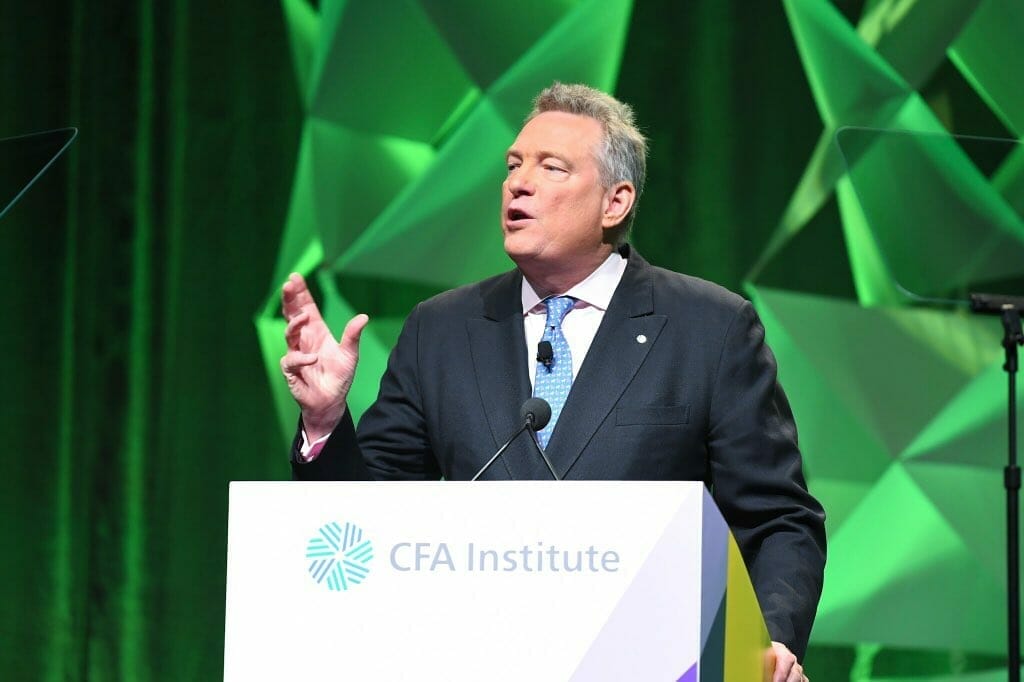CFA Institute chief executive Paul Smith is pretty clear the industry has had a “good ride” and that a fundamental shift in some behaviours and practices will be needed to regain trust from clients, probably including a reduction in salaries.
“The old saying is true, trust takes a lifetime to build and a second to lose,” Smith says. “We have arguably destroyed it over time but 2008 was the last straw. It’s going to be a lifetime of rebuilding trust with the public and will have to include looking at the old structures and recruiting practices. What are the incentives for the old guard to change?” he asked.
Smith was speaking with Top1000funds.com in his hometown of Hong Kong and feeling nostalgic for the smells and sounds of the vibrant city, where more than 2000 delegates attended the 71stCFA Institute Annual Conference, which had closed just an hour earlier.
At the beginning of the year, he moved to Charlottesville, Virginia, where CFA is headquartered, keen to be closer to the majority of the team. He is three-and-a-half years into his five-year commitment as chief executive of the organisation, and has some firm agenda items set out for the next 18 months.
Initiatives to rebuild trust
He says the steps for rebuilding trust include increasing the number of charterholders from the current 150,000 in 65 countries.
“Professionalism is at the core of what we do, and we need to talk more loudly about that,” he says. “We deserve a thrashing if we can’t self-police, what other option is there other than regulation. A professional body is the answer, as it has an element of self-regulation. That can complement the regulator, which should be the backstop. Instead, the regulator has been forced onto the frontline all over the world.”
The CFA Institute has a number of initiatives in the works, including the Future of Finance, and publications the Future State of the Investment Professionand the Investment Firm of the Future, which are aimed at the industry taking on some responsibility for the trust crisis.
“At the moment, we have an industry rather than a profession; people are selling something, not providing a service,” Smith says.
He believes cognitive diversity in the industry is central to changing this, which means changing hiring practices.
“The industry is anchored around alpha, and a male, testosterone-fuelled ethic. We need to centre it around people who are motivated by service,” Smith says. “The skills of the future will be more soft, around empathy and how to translate solutions for people. Employment will be based on an ability to talk to people.”
CFA charterholders make up only 9 per cent of the industry that looks after other people’s money. But there are many benefits a professional body can bring, Smith says.
“Our charterholders have to sign an annual statement,” he explains. “If we keep reminding people about their commitment, they behave better. Ethics are situational.”
Every year, the CFA takes charters away from about 10 charterholders who it deems to have misbehaved. It suspends a great deal more than that.
“We also look at about 350 conduct cases every year,” he says. “All are public, and about one-third are proved.”
A metric for motivation
A 2016 report commissioned by the CFA Institute in collaboration with the State Street Center for Applied Research, Discovering Phi: Motivation as the hidden variable of performance, examines the motivations of finance industry participants. The report measures phi, which it outlines as the combined motivational force of three key ingredients: purpose, habits and incentives. It shows that a 1 per cent improvement in phi can be associated with a 28 per cent increase in the odds of excellent organisational performance, a 57 per cent increase in the odds of excellent employee engagement, and a 55 per cent increase in the odds of outstanding client satisfaction.
The report states that 53 per cent of asset managers and other intermediaries say that although they originally pursued their career because they were passionate about financial markets, they feel that the industry has disconnected from its true purpose.
Just 28 per cent of respondents worldwide said they remain in the investment management industry to help clients achieve financial goals.
“Wanting to help people is not on the list of what motivates finance professionals, but if you look at other professionals, like doctors, helping [people] is high on their list of motivations,” Smith said. “Our profession has created real value for our clients, societies and ourselves. We don’t say that enough, or explain it enough. We must proclaim our sense of purpose. If the industry rediscovers its sense of purpose, we can martial the finance in the world towards its problems, like financial inclusion, poverty and climate change.”
Lower salaries
The industry is also changing in ways, Smith says, not the least of which is that investment management margins are under pressure.
“We will have to pay people less,” he asserts. “Automation will bring more consistent advice to people at a cheaper price. This is a very fat industry. But the good news for young people wanting to work in it is that there is still a very good standard of living and you’re not down a coalmine.
“Over time, this industry will be less well paid than it is today. My generation has been in the right place at the right time. But the positive message is to do it because you love it and want to deliver something to your clients.”
CFA is addressing the changing skill-set finance professionals require by offering courses for charterholders after they complete the CFA curriculum.
“A profession is not a one-and-done thing, but needs a commitment to ongoing learning. We are offering courses in soft skills, such as empathy and strategic thinking.”
One example of this is a CFA workshopwith the Royal Academy of Dramatic Arts that teaches self-expression and presentation skills.
But Smith also admits that the core CFA curriculum will need to be extended beyond just technical competencies.
“We believe the CFA charter is the appropriate level for people who look after other people’s money, and we will try to get the message out about the CFA, and our role as a professional body,” he says. “Our success can be measured by [whether the number of charterholders grows], but also by things like whether we can detect policy intricacies that we put forward being adopted. The softer side is more interesting but slippery by definition. For me, it’s about the level of discourse. I like BlackRock’s Larry Fink talking about the future of capitalism and the fact there are now a lot of events [regarding] connecting finance to a sense of purpose.”



